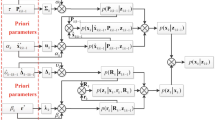Abstract
When the state-space model is black-box, it is difficult to identify the system based on the input and observation. In predictive control and other fields, the state and model need to be updated in real time, and online identification becomes very important. However, compared with offline learning, online learning of black-box model is more difficult. This paper proposes an online Bayesian inference and learning method for state-space models with missing observations. When the state-space model is black-box, we expressed it as basis function expansions. Through the connection to the Gaussian processes (GPs), the state and basis function coefficients are updated online. The problems of missing observations caused by the sensor failure are often encountered in practical engineering and are taken into consideration in this paper. In order to keep the online algorithm from being interrupted by missing observations, we update the states and unknown parameters according to whether the observation is missing at the current time. This conservative strategy makes the online learning continuous when the observation is missing, and makes full use of the available statistics in the past. Numerical examples show that the proposed method is robust to missing data and can make full use of the available observations.
Access this chapter
Tax calculation will be finalised at checkout
Purchases are for personal use only
Similar content being viewed by others
References
Sinha, N.K.: System identification—theory for the user: Lennart Ljung. Automatica 25(3), 475–476 (1989)
Sjöberg J., et al.: Nonlinear black-box modeling in system identification: a unified overview. Automatica 31(12), 1725–1750 (1995)
Moon, T.K.: The expectation-maximization algorithm. Signal Process. Mag. IEEE 13(6), 47–60 (1996)
Matarazzo, T.: STRIDE for structural identification using expectation maximization: iterative output-only method for modal identification. J. Eng. Mech. 142(4) (2015)
Ghahramani, Z., Hinton, G.E.: Variational learning for switching state-space models. Neural Comput. 12(4), 831–864 (2000)
Blei, D.M., Jordan, M.I.: Variational inference for Dirichlet process mixtures. J. Bayesian Anal. 1(1), 121–143 (2006)
Jacobs, W.R., et al.: Sparse Bayesian nonlinear system identification using variational inference. IEEE Trans. Autom. Control. 63, 4172 (2018)
Kullberg, A., Skog, I., Hendeby, G.: Online joint state inference and learning of partially unknown state-space models. IEEE Trans. Signal Process. 69, 4149–4161 (2021)
Tobar, F., Djuric, P.M., Mandic, D.P.: Unsupervised state-space modeling using reproducing kernels. IEEE Trans. Signal Process. 63(19), 5210–5221 (2015)
Svensson, A., Schön, T.B.: A flexible state space model for learning nonlinear dynamical systems. Automatica 80, 189–199 (2017)
Solin, A., Särkkä, S.: Hilbert space methods for reduced-rank Gaussian process regression. arXiv (2014)
Berntorp, K.: Online Bayesian inference and learning of Gaussian-process state–space models. Automatica 129, 109613 (2021)
Gopaluni, R.B., et al.: Particle filter approach to nonlinear system identification under missing observations with a real application. In: Ifac Proceedings Volumes (2009)
Gopaluni, R.B.: Nonlinear system identification under missing observations: the case of unknown model structure. J. Process Control 20(3), 314–324 (2010)
Lindsten, F., Jordan, M.I., Schn, T.B.: Particle Gibbs with ancestor sampling. J. Mach. Learn. Res. 15(15), 2145–2184 (2014)
Author information
Authors and Affiliations
Corresponding author
Editor information
Editors and Affiliations
Rights and permissions
Copyright information
© 2022 The Author(s), under exclusive license to Springer Nature Singapore Pte Ltd.
About this paper
Cite this paper
Li, X., Ma, P., Chao, T., Yang, M. (2022). Online Identification of Gaussian-Process State-Space Model with Missing Observations. In: Fan, W., Zhang, L., Li, N., Song, X. (eds) Methods and Applications for Modeling and Simulation of Complex Systems. AsiaSim 2022. Communications in Computer and Information Science, vol 1712. Springer, Singapore. https://doi.org/10.1007/978-981-19-9198-1_8
Download citation
DOI: https://doi.org/10.1007/978-981-19-9198-1_8
Published:
Publisher Name: Springer, Singapore
Print ISBN: 978-981-19-9197-4
Online ISBN: 978-981-19-9198-1
eBook Packages: Computer ScienceComputer Science (R0)





